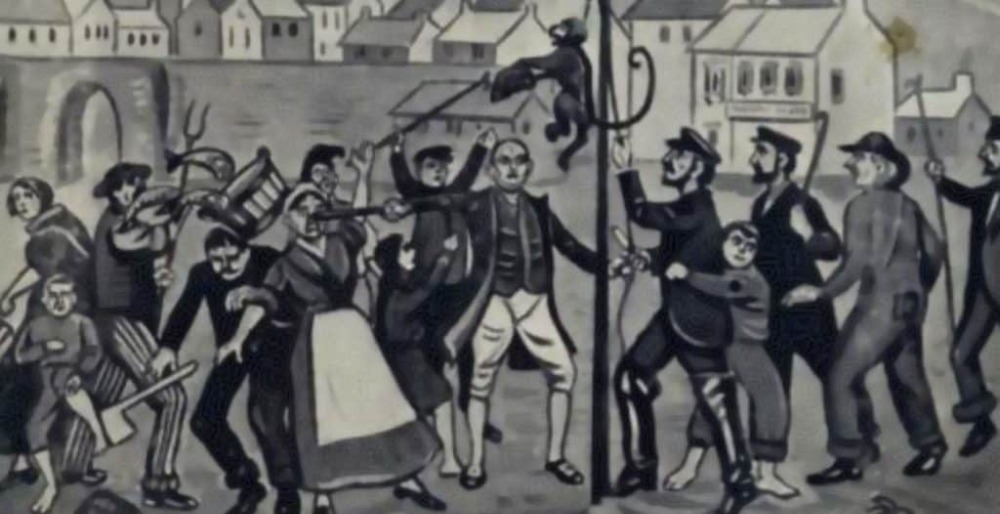Old Gold Racing
April 9, 2020William Willet's Scam
The habitués of the local tavern in Endon, Staffordshire, in 1752 were distracted and angry. The powers-that-be had recently taken a unilateral policy decision with massive ramifications for millions of people, and had imposed it without consultation...

Marlon Brando, as Sky Masterson in Guys and Dolls, had some words for an impatient Frank Sinatra: ‘On the day I left home to make my way in the world, my daddy took me to one side. “Son”, my daddy says to me, “I am sorry I am not able to bankroll you to a very large start, not having the necessary lettuce to get you rolling. Instead I am going to stake you some very valuable advice. One of these days in your travels, a guy is going to show you a brand new deck of cards on which the seal is not yet broken. Then this guy is going to offer to bet you that he can make the jack of spades jump out of this brand new deck of cards and squirt cider in your ear. But, son, you do not accept this bet, because as sure as you stand there, you’re gonna wind up with an earful of cider”.
Habitues of the local tavern in Endon, Staffordshire, in 1752, should have been listening to similar wisdom.
But they were distracted and angry. The powers-that-be had recently taken a unilateral policy decision with massive ramifications for millions of people, and had imposed it without consultation.
In a country-wide propaganda campaign, supported by the press, dubious speculation was repeatedly presented as fact. Dissenters were made to feel disloyal, unpatriotic and selfish, and the forces of law and order, armed with special powers, were deployed to suppress unrest.
250 years ago the government felt able to treat the people like that.
By diktat, it was declared that the day following September 2nd would be September 14th. An ancient miscalculation in the old Julian calendar meant that we were getting ahead of ourselves, or possibly behind ourselves. In any case the dates needed to be adjusted.
History has maligned the protesters. It’s true that those who believed the date of their death was preordained were discommoded, but there were other reasons. Having celebrated New Year at a very sensible time – in early Spring – they were now commanded to do so on 1st January. Other dates were arbitrarily changed. The tax department was a stubborn, unlikely rebel. They held out, refusing to be modernised, failing to understand what was wrong with starting their twelve month term in April …
William Willett of Endon was known for not caring what day it was and was often so drunk he didn’t know. He spent his time and his meagre wage in the pub striking bets, most of which he lost.
Like a stopped clock, William was very occasionally right. Here he saw an opportunity. He offered to bet anyone who would listen that he could dance around the village for twelve consecutive days without a break. He was insistent, and eventually had amassed a very considerable portfolio of wagers.
Those taking him on were not all idiots, but they knew his track record and felt that he had finally gone mad. Why not take his money since he was giving it away?
Just before midnight on 2nd of September William began an improvised dance. His unpleasant singing voice ensured that within a few minutes everyone still awake in the village had heard him.
He then stopped, suffused with hysterical laughter, and pounded on the door of the tavern, screaming that they let him in because he was rich. It was the 14th of September and he had danced since the 2nd. Initially suspicious, they finally opened the door. Business was business. Others joined, the drinks were on Willett.
Those creditors reluctant to cough up were reminded that gambling debts, unenforceable by law, were a matter of honour, and that if they had been tricked it was their stupid fault. It would be easy, in any case, to win the money back.
Meanwhile, the protests continued. There were some small victories for the common man. Landlords had charged a full month’s rent for September but, naturally, paid their tenants only for days worked. The latter, out of pocket, complained. Only after the publication of the strongly worded views of King George II did the landlords relent.
This, pre-dating holiday pay and sick pay, was the first example in Britain of labour being paid for by an employer when no work had actually been done.
The economy just about recovered. It hadn’t, after all, cost 50 billion.

Written by:
Old Gold Racing
Share article:


